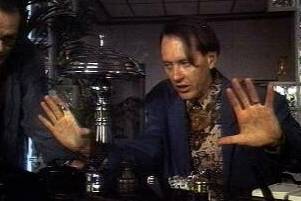 Every successful screenwriter I know is brilliant at pitching. The ability to pitch well accelerates every aspect of your career in cinema or TV - from coming up with new ideas to developing them, and of course selling them. Last time, we started by looking at your seed image. If you missed the article, read it here). This time, we’re getting stuck into the pitch or log line. Why have a pitch at the start? A good log line is essentially a one or two sentence pitch which has something magical that makes your listener’s eyes light up - this is the spark. Nowadays I never start writing a script unless I have a log line with that spark - after all the first person I have to sell the idea to is myself. As I write, and then as I edit, the pitch helps keep the script focused. And at the end, the pitch is central to selling it to producers. What’s your pitch? There’s a certain magic you need in creating a good idea that you can’t force into existence. But you can create the right conditions for finding it. And you can do that right now. You don’t have to be clever, you have to be imaginative, disciplined and committed to not accepting second-best. And you need three ingredients to make the pitch work: 1. What’s your genre? Ingredient one is the genre - in other words, what kind of story is this going to be? Will it make people laugh, or cry, or scream in horror? Or what? Genre is first and foremost about the emotion you want to create in the viewer. The seed image probably gave you a hint of that emotion. Now is the time to dig deeper into your imagination. Imagine the audience watching your work on screen. What do they feel? 2. Who does what? Ingredient two in a good pitch is the Outer Story. Who is your protagonist and what does he or she want? Focus on the big decision that underpins the whole story. In Hamlet it’s the decision to avenge his father’s murder. In Joy it’s the decision to invent a self-wringing mop. It’s an “outer” story because we have to film it - in other words it’s not just inside their head. 3. What’s their flaw? By contrast, ingredient three is the Inner Story. What is the inner flaw that’s stopping the protagonist from progressing? On its own, the outer story is rather thin and mechanical. This inner struggle gives it depth. Hamlet has to conquer his fear of taking action (he fails to do this in time, which gives us a tragic ending). Joy has to learn to stand up for herself. If, she does that she’ll earn her happy ending. In some stories, you find a mix, part growth, part failure, giving a bittersweet end. Put it together To create your pitch, put them together: GENRE plus OUTER STORY plus FLAW. Hamlet is a revenge tragedy about a young prince who must avenge his father’s murder but must confront his own fears before he can confront the murderer. Joy is a comedy-drama about an insecure but ambitious young woman who sets out to invent the world’s first self-wringing mop and must learn to stand up for herself if she’s to succeed Where’s the rest? Where’s the rest of the play? The brilliant writing? The subtle interrogation of philosophy? The other characters? The subplots? They don’t belong here. Don’t confuse the log line with the script. The job of the pitch is simply to excite - to excite you enough to write the screenplay and then to excite producers enough to read it! That simple sentence can take hard work to write. You need to focus hard on the absolute essentials, and cut away everything else - your 90+ page idea boiled down into a single line. But if you get it right, it will form the foundation of everything you do next - whether that’s writing the outline, editing a draft - or indeed selling it. Next: Writing the treatment.
1 Comment
6/2/2016 07:25:19 pm
Number three is now up: on why you need to expert at writing treatments To read it click my name above this reply, or paste this into your browser window:
Reply
Leave a Reply. |
BLOGTHE ONLY PLACE TO TALK ABOUT THE CRAFT OF SCRIPTWRITING. Archives
November 2023
|
Privacy Policy © Euroscript Limited 2020

 RSS Feed
RSS Feed


